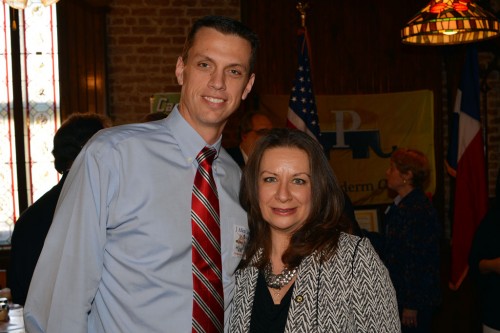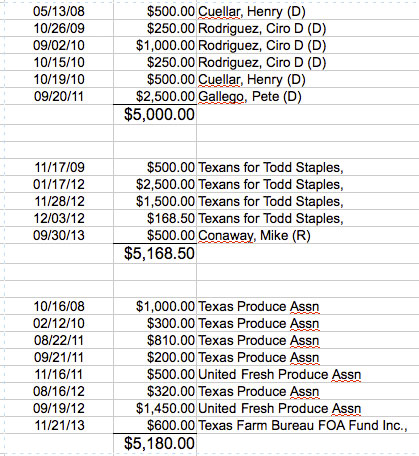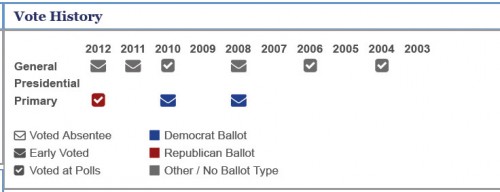With current Texas Ag Commissioner Todd Staples giving up his post to run for Lt. Gov., there are four candidates running for the position. This past Thursday, I met one of those candidates, J. Allen Carnes, Mayor of Uvalde, at the Downtown Houston Pachyderm Club. I’ve been curious about him because there have been questions floated about which party he really belongs to and because of a rather glowing profile in the leftist Texas Observer.

Before the meeting, I researched his campaign contributions. After all, you can learn a lot about where a man puts his money, right?

Other than the fact that he has contributed far more in total than probably 99.9{997ab4c1e65fa660c64e6dfea23d436a73c89d6254ad3ae72f887cf583448986} of Texans, there is a pattern that emerges if you look at the timeline. An earlier leaning towards Democrats, a switch to R’s, mostly Commissioner Staples, and an overall concern for his industry as a whole. Although probably coincidental, it is interesting that he spread his money evenly between the three.
As for his voting record, I found this:

As you can see, his voting history shows that he did not participate in a primary election until 2008, when he voted in the Democratic Primary. And in 2010, he again voted in the Democratic Primary. The records show that he has only voted in one Republican Primary, in 2012. I asked him about his voting record during the question/answer period at the meeting and this is his answer:
As you heard, he said that he voted in the 2010 Democratic Primary to support a certain County Judge candidate and that if you want to participate in local politics in his county, you have to vote in the Democratic Primary. He also stated that he believes in local control and has been involved in Republican primaries since he was 16 years old.
In addition, I asked his campaign for clarification on both his reason for voting in the Democratic Primary in 2008 and his record showing no primary voting prior to that, given his statement that he has been involved in Republican primaries since he was 16 years old.
His staff told me that in 2008, he wanted a particular candidate for County Sheriff and had to vote in the Democratic Primary to support her. As for no records showing that he voted in Republican primaries before 2012, I received call from a Karen Miller on Carnes’ behalf and she theorized that because the Republican Party was pretty much non-existent in before a couple of years ago, that it was probably a record keeping problem.
So there you have that – you can do with the information as you wish. What I see doesn’t automatically disqualify him but I can understand people hesitating before committing to vote for him.
The position of Texas Agriculture Commissioner is unique in that it has specific requirements that must be met in order to hold the office. From the Texas Agriculture Code:
Sec. 11.005. QUALIFICATIONS. (a) To be eligible for election as commissioner or appointment to fill a vacancy in the office of commissioner, a person must:
(1) have been engaged, for at least five of the 10 years preceding the year in which the person is elected or appointed to the person’s initial term, in the business of agriculture;
(2) have worked, for the five-year period preceding the calendar year in which the person is elected or appointed to the person’s initial term, for a state or federal agency in a position directly related to agriculture;
(3) have owned or operated, for at least five of the 10 years preceding the year in which the person is elected or appointed to the person’s initial term, farm, ranch, or timber land that qualifies for agricultural use appraisal under Subchapter C, Chapter 23, Tax Code, and be participating, in the calendar year in which the person is elected or appointed to the person’s initial term, in a farm program administered by the federal Agricultural Stabilization and Conservation Service; or
(4) have worked, for at least five years at any time before the calendar year in which the person is elected or appointed to the person’s initial term, for the Texas Agricultural Council, an organization that is a member of the Texas Agricultural Council, or another agricultural producer association.
(b) For purposes of this section, a person is engaged in the business of agriculture if the person is engaged, for the purpose of wholesale or retail sale, in:
(1) the production of crops for human or animal consumption, or planting seed;
(2) floriculture, viticulture, horticulture, or aquaculture;
(3) the raising or keeping of livestock; or
(4) the processing of any of the products listed in Subdivisions (1) through (3) of this subsection.
By anyone’s measure, Carnes meets these requirements. In fact, if you were to use these requirements alone, he is by far the most qualified to hold the position. Even though it was published in the leftist Texas Observer, I’d urge you to read the profile on Carnes. I’ve talked to Christopher Hooks, the author of the piece, on other matters and if you skip the obligitory knocks on conservatives, it gives you a good idea who Carnes is.
Look, if you want someone running for Ag Commissioner on a platform of being anti-abortion and anti-gay marriage, then that is your prerogative and you can vote as you wish. But if you are looking for someone that knows the industry, knows the issues facing Texas farmers and ranchers, knows the issues of distributing food around a state this large, and is endorsed by most of the groups that are actually involved in agriculture, you should take a look at J. Allen Carnes. I like his take on campaigning for the position, the droning on of other candidates to fight Washington, and how he would approach the position:
Focus On Texas
It seems the focus of many candidacies in this election cycle is on how a candidate is going to stand up to Washington and go toe-to-toe with the federal government and its agencies. I think a lot of this is political posturing and pandering on the part of candidates. For example, in all my years in and around agriculture, I’ve never laid eyes on an EPA agent.
That being said, there certainly are any number of examples of federal government overreach. There have been and I’m sure will continue to be issues affecting Texas agriculture going forward, where we as a State will feel compelled to contest the federal government in the courts. On those occasions, as Commissioner of Agriculture, I will engage the Texas Attorney General to carry our fight in the courts, which is the job the Attorney General is elected to do. In such instances, the job of the Commissioner of Agriculture, as I see it coming from an agricultural background, is to provide the Attorney General with an understanding of the agricultural perspective on and interests in whatever the facts of the case might be.
If I were an attorney, I might see it differently and simply by nature want to engage the fight on my own, but this is not, in my opinion, what the citizens of Texas elect their Commissioner of Agriculture to do. My focus as Commissioner of Agriculture will be to ensure a strong, enduring foundation upon which Texans can rely to provide the agricultural necessities of life; most notably food, clothing and shelter. While not ignoring possible threats from outside of Texas, my focus will be here in Texas on Texas agriculture and Texas citizens.
Website: JCarnesforTexas.com
Facebook: J. Allen Carnes
Twitter: @JAllenCarnes